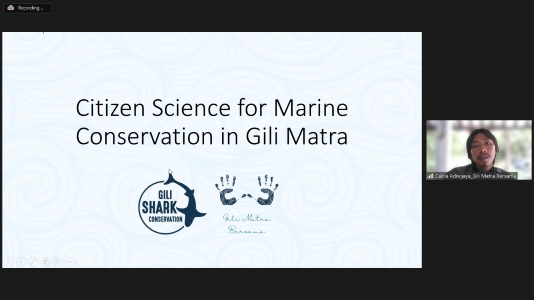Understanding the New Trend of Citizen Science’s Role in Marine Conservation in Gili Matra

Nowadays, the role of citizen science in environmental and biodiversity research activities is considered important. This was revealed in the School of Coral Reef Restoration (Scores) activity held by the Department of Marine Science and Technology (ITK), Faculty of Fisheries and Marine Science (FPIK) IPB University.
"Citizen science is a new trend in environmental and biodiversity research that involves public participation to collaborate with scientists in the collection, analysis and publication of research data. This is useful for increasing understanding in managing existing resources and increasing the amount of data and information," said Cakra Adiwijaya from the Gili Matra Foundation as a resource person for the Scores activity, recently.
According to Cakra, anyone can become a researcher with citizen science. Citizen science is science for everyone, especially for people who are interested and involved in research teams.
"Our activities focus on coral conservation, marine life conservation, shark conservation, plastic free paradise campaign," he explained during the presentation.
Cakra revealed that he uses a number of methods in running citizen science programmes in Marine Conservation in Gili Matra. These methods include measuring coral health index with the CPCe application, maintenance, coral watch, photo ID and monitoring and deploying hex domes.
Meanwhile, he continued, shark monitoring is carried out using several methods such as photo ID, survey dives, BRUF Photo ID and Unite Gili. A number of these steps are taken to see patterns or patterns in sharks so that their species can be identified.
"We plan to make Hans Reef Gili Air a restoration dive site according to the path that has been mapped," explained Cakra Adiwijaya.
Attractively, Cakra continued, the Gili Matra Foundation also accommodates Indonesian women to contribute to marine conservation activities through the 'Coral Catch' scholarship programme located in Gili Air, Indonesia.
"This programme is specifically for Indonesian women who are dive-certified to empower those who want to pursue their careers in marine conservation, thus creating a community of women who create healthy seas and together in coral reef restoration in Indonesia," Cakra added.
Dr Beginner Subhan, one of IPB University's lecturers at the Department of ITK FPIK appreciated the programmes that have been launched by the Gili Matra Foundation. He also gave full support for future collaborations between academics and conservation practitioners.
"The role of citizen science in coral conservation is increasingly important along with the development of technology and public awareness," he said in response to the role of citizen science.
According to him, with the active involvement of the general public, scientists and the government, data can be obtained more widely. In addition, citizen science will accelerate conservation actions and maintain coral ecosystems that are very valuable for marine life and humans.
"Coral reef restoration activities are not only direct or one-way activities such as coral planting, but many other activities are carried out in the implementation of coral reef restoration such as socialisation in the form of an invitation not to throw garbage in the sea and introduce coral reefs and the importance of these ecosystems for the environment, especially the coast," explained Dr Beginner Subhan in his speech. (DHAA/ARS/Rz) (IAAS/RUM)


